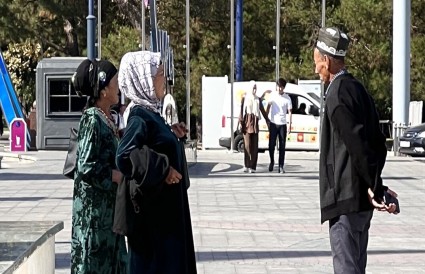Blogger Otabek Sattoriy, sentenced to 6.5 years in May 2021, was transferred from a general regimen colony to an open prison colony. This was announced by the head of the Ezgulik Human Rights Society of Uzbekistan, Abdurakhmon Tashanov.
According to the law, convicts who have taken the path of correction and have served at least one third of their sentence are transferred to open prison colonies.
Sattoriy’s case
Officers of Termez police department arrested Otabek Sattoriy on January 29, 2021. A video has surfaced on social networks showing police officers putting a man into a car and taking him away. Initially, the criminal case was launched under Extortion charge, which was afterwards reclassified as Part 2 of this article, and later new charges were brought.
The lawyer argued that the case was fabricated. Then-MP Rasul Kusherbaev, the British Ambassador, the head of the board of trustees of the Public Fund for the Support and Development of National Mass Media Komil Allamjonov, the Committee to Protect Journalists (USA) and others responded to the situation. In response to this, the Ministry of Internal Affairs warned of existence of liability for interfering in the investigation of a criminal case.
On May 10, 2021, the court sentenced Sattoriy to 6 years and 6 months of imprisonment in a general regimen colony. The prosecutor requested 11 years in prison for him.
The appellate instance and the Supreme Court left the sentence unchanged.
The former head of the board of trustees of the Public Fund for the Support and Development of National Mass Media, Komil Allamjonov (now the head of the Department of Information Policy of the Presidential Administration), noted against the backdrop of this case that “if intimidated a journalist or blogger can turn into an anonymous person.”
“If we, instead of protecting and supporting journalists, intimidate them to such a state that they cannot say anything, their place will inevitably be taken by those who will cause trouble from the outside!” - he said.
Differences between a general regime colony and an open prison colony
Penal colonies are divided into open prison colonies, general, strict, and special regimen colonies and are intended to house convicts who have reached the age of majority.
General regimen colonies house men who have been sentenced to imprisonment for the first time for serious and especially serious crimes. While, in open prison settlements there are those sentenced to imprisonment for crimes that do not pose a great public danger, less serious crimes committed through negligence, as well as for intentional less serious crimes.
In open prison colonies, convicts:
- are kept unguarded, but under supervision;
- enjoy the right of free movement within the territory of the colony during the hours from waking up to lights out;
- may move with the permission of the administration without supervision outside the territory of the colony, if this is necessary due to the nature of the work they perform or in connection with training;
- can wear civilian clothing;
- can have money and valuables and use them in unlimited quantities;
- can have telephone conversations (without the Internet), receive and send parcels, transfers and parcels in their free time without restrictions.
They can cook their own food from food purchased at their own expense and from products contained in packages.
While, convicts also have the right to receive short-term visits without limitation, and 24 long-term visits during the year. Visits are usually provided during free time from work. If it is impossible to provide a long visit on the territory of the open colony, at the request of the convict, the visit may be granted outside the territory of an open colony, in the territory of the district (city) where this colony is located.
Convicts live in room-type dormitories. Convicts who do not violate the regimen of detention and have families, by order of the head of the institution, may be allowed to live separately with their families on the territory of the open colony or in the territory of the district (city) where the open colony is located.
Their correspondence is not censored. They have the right to annual paid leave of 15 working days. Leave is granted with the right to travel outside the open colony.














